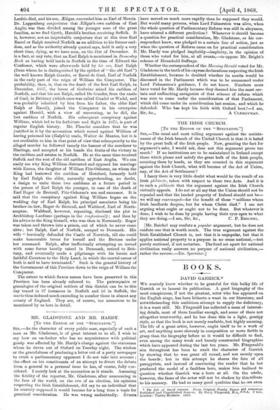MR. GLADS'fONE AND MR. HARDY.
[To THE EDITOR OF THE "SPECTATOR."] Sin,—As the character of every public man, especially of such a man as Mr. Gladstone, is of great interest to us all, I wish to say how an on-looker who has no acquaintance with political gossip was affected by Mr. Hardy's charge against the statesman whom he drove out of Oxford on Tuesday night. The wisdom or the gracefulness of producing a letter out of a party newspaper to crush a parliamentary opponent I do not take into account ; the effect on his constituents of an attempt to divert the debate from a general to a personal issue he has, of course, fully con- sidered. I merely look at the accusation as it stands. Assuming the fidelity of the reporter, Mr. Gladstone, after announcing in the face of the world, on the eve of an election, his opinions respecting the Irish Establishment, did say to an individual that he scarcely supposed it would become for a long time a topic for practical consideration. He was wrong undoubtedly. Events have moved on much more rapidly than he supposed they would. But would many persons, when Lord Palmerston was alive, when the whole question of Parliamentary Reform was still in abeyance, have uttered a different prediction ? Whenever it should become a question for practical consideration, Mr. Gladstone, as his cor- respondent knew, was pledged to a certain line of action, just as when the question of Reform came on for practical consideration Mr. Hardy was pledged implicitly—implicity, in the opinion of those who voted for him, at all events,—to oppose Mr. Bright's scheme of Household Suffrage.
Whether the correspondent of the Morning Herald voted for Mr. Gladstone in the teeth of his express declarations respecting theIrish Establishment, because he doubted whether its merits would be discussed in the Parliament which was to be summoned under Lord Palmerston's guidance, I do not know. Numbers must have voted for Mr. Hardy because they deemed him the most cer- tain and unflinching antagonist of that scheme of reform which was sure to come under the consideration of that Parliament, which did come under its consideration last session, and which he defended. Who has kept his faith with Oxford best ?—I am,






























 Previous page
Previous page